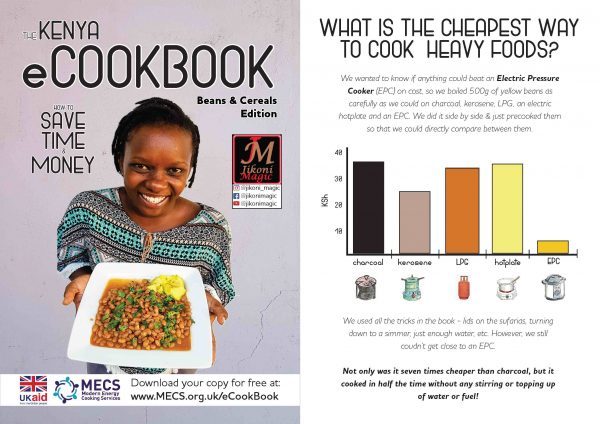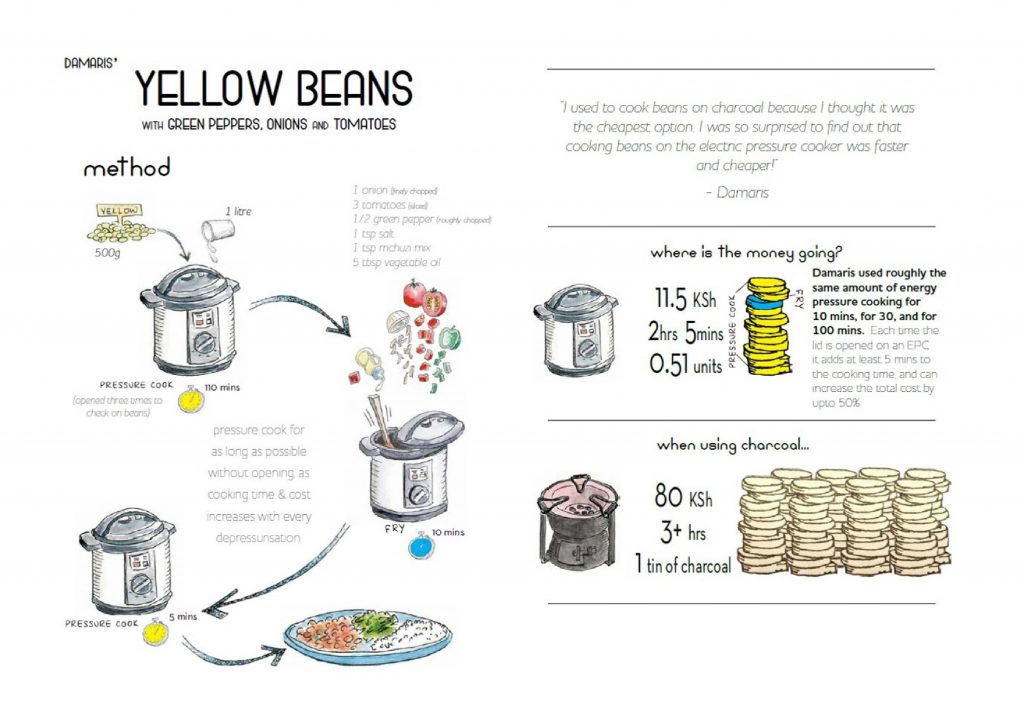The Kenya eCookbook: Beans & Cereals Edition is the first of a series of eCookbooks designed to support Kenyan cooks in how to make more informed choices about the fuels and appliances that they use at home. It shows how energy relates to money & time so the cook and household can understand how to save both by using smarter cooking techniques, fuels and appliances. The focus is on electricity and the time/money that could be saved by switching from other fuels. Furthermore, the eCookbook highlights how households can save even more, by adopting energy-efficient cooking practices (e.g. soaking beans) and energy-efficient cooking appliances (e.g. an Electric Pressure Cooker or EPC).
The Kenya eCookbook was produced in Nairobi and focusses on one of the most energy intensive popular food groups: beans and cereals. The ceramic jiko full of red hot charcoal simmering away beside the kitchen door, with a pot of beans on top is a familiar sight across Nairobi. Even in 2019, many households with a kerosene, gas or electric stove still cook ‘heavy foods’ like beans on charcoal because most people believe it’s cheaper – but as this eCookbook reveals, it is not!

This eCookbook began during the cooking diaries study in Nairobi in 2018. It was part of a research study called ‘Low cost energy-efficient products for the bottom of the pyramid’ and continued under the ‘Modern Energy Cooking Services’ programme, both of which were supported by the UK government. The study involved 20 households recording what they cooked, how they cooked it and how much energy they used for 2 weeks. Then they switched to cooking solely with electricity for the next 4 weeks, continuing to record data.
Renewable energy generation is increasing access to affordable and reliable electricity and opening new windows of opportunity for cooks across Kenya. However, most people have very little idea how much electricity is needed to cook, let alone how much it actually costs compared to the other fuels available on the market. Many are also unaware of the broad range of modern energy-efficient cooking appliances that are now available and how compatible each one is with popular dishes, such as beans. This eCookbook seeks to change this by exploring the relationship between energy use and cooking to inform cooks on how best to take advantage of these new opportunities.
eRecipes

Damaris’ eRecipe for yellow beans with a green pepper, onion and tomato sauce.
For this eCookbook, we focussed in on four of the cooking diary participants, Christine, Damaris, Karen and Judy, and explored in greater detail exactly how they cooked beans. We measured the energy they consumed throughout the cooking process to pinpoint exactly where energy was wasted and where it was saved. We collated this into a series of eRecipes, describing what each cook did and what the energy implications of cooking in that way were.
Introducing the eCookbook cooks

The four eCookbook cooks, from left to right: Christine, Damaris, Karen and Judy.
Damaris: “I used to cook beans on charcoal because I thought it was the cheapest option. I was so surprised to find out that cooking beans on the electric pressure cooker was faster and cheaper!”
Karen: “With the electric pressure cooker it’s way quicker, cheaper and easier. If I put all the ingredients in at the beginning, I can cook beans from scratch in just over an hour.”
The eCookbook was produced in close consultation with the four featured cooks and many other everyday Kenyan cooks.
Download the eCookbook
This is a web downloadable version (4MB), for a print quality version (100MB) please email us to request a copy.